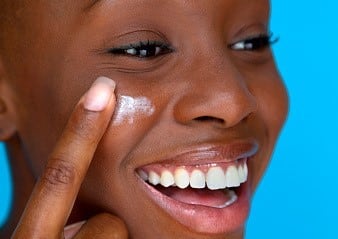Dermatologists who specialize in treating black women say our number one complaint is trying to achieve a healthy, glowing even skin tone, free of dark spots and other forms of hyperpigmentation. To achieve this, many women collect a small arsenal of exfoliation products—peels, scrubs, acids—and try them all in an effort to erase the tell-tale signs of acne or other forms of damage to the skin.
Yet overdoing it may do more harm than good, reports the American Academy of Dermatology (AAD). With the new year, many of us are dealing with dry, itchy skin stressed by cold weather and indoor heat or just trying out new products, so it’s a great time to reevaluate your skin care regimen.
Proper exfoliation can improve the appearance of skin by removing dead skin cells, but “for some people, exfoliation can actually make their skin worse with increased redness or acne breakouts,” said Rebecca Tung, MD, associate professor of dermatology at Loyola University Medical Center in Maywood, Ill, in an AAD interview. “If you choose to exfoliate, it’s important to do so safely so that it does not damage your skin.”
Before exfoliating, consider your skin type:
▪ Darker skin may not respond well to harsh exfoliators.
▪ Sensitive skin often burns or stings after use of skin care products.
▪ Normal skin is clear and not sensitive.
▪ Dry skin is flaky, itchy or rough.
▪ Oily skin is shiny and greasy.
▪ Combination skin is dry in some areas and oily in others.
“Understanding your skin type will help you choose an exfoliation method that best suits your skin,” Tung said. Dead skin can be removed with a mechanical tool, such as a brush, scrub or sponge or with chemicals, such as alpha- and beta- hydroxy acids.
To prevent damage
Yet, any skin care product that causes even slight injury to the skin can trigger inflammation in darker complexions, causing the skin to increase melanin in that area and produce a dark spot. If you are considering a professional strength scrub or acid peel, be sure to consult a dermatologist specializing in black skin to help you select a safe treatment.
▪ Before you try anything new, take an inventory of what you have at home. Toss out anything that makes your skin more sensitive or discuss it with your dermatologist if it’s a prescription retinoid creams or products containing retinol or benzoyl peroxide and you are not getting results. Exfoliating at the same time that you are using these products can trigger acne breakouts or excessive dryness or cause discoloration.
▪ At home, avoid harsh peels and scrubs, such as those with sharp-edged,natural scrubbing granules or baking soda which is too harsh for skin. Opt for gentle, over-the-counter products such as Olay Skin Smoothing Cream Scrub or Neutrogena Deep Clean Gentle Scrub.
▪ People with dry, sensitive or acne-prone skin should consider using a washcloth and mild chemical exfoliator. Those with oily, thicker skin may prefer stronger chemical treatments or mechanical exfoliation.
▪ Be kind to your skin. Scrubs or chemical exfoliators should be applied gently in a small, circular motion for about 30 seconds. Rinse with lukewarm water. Never exfoliate if your skin is broken, cut or sunburned.
▪ Apply moisturizer immediately after exfoliating.
▪ Don’t overdo it. In most cases, the more aggressive the exfoliation, the less often it should be done. Exfoliating too often can leave skin red and irritated. Ask your dermatologist to advise you about how often to exfoliate, but start with once a week.
Photo credit: Getty: Creative RM, Scott Quinn








